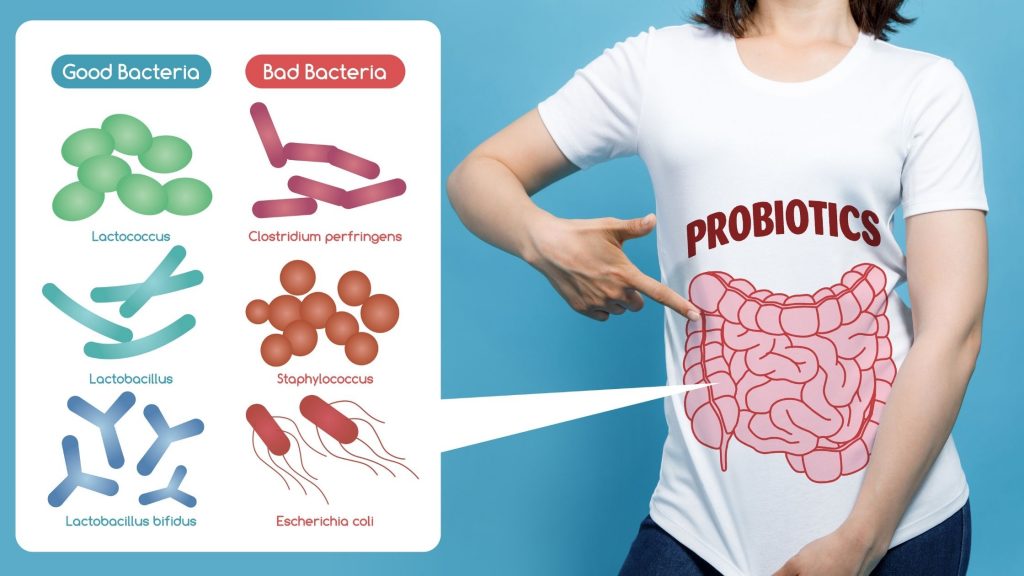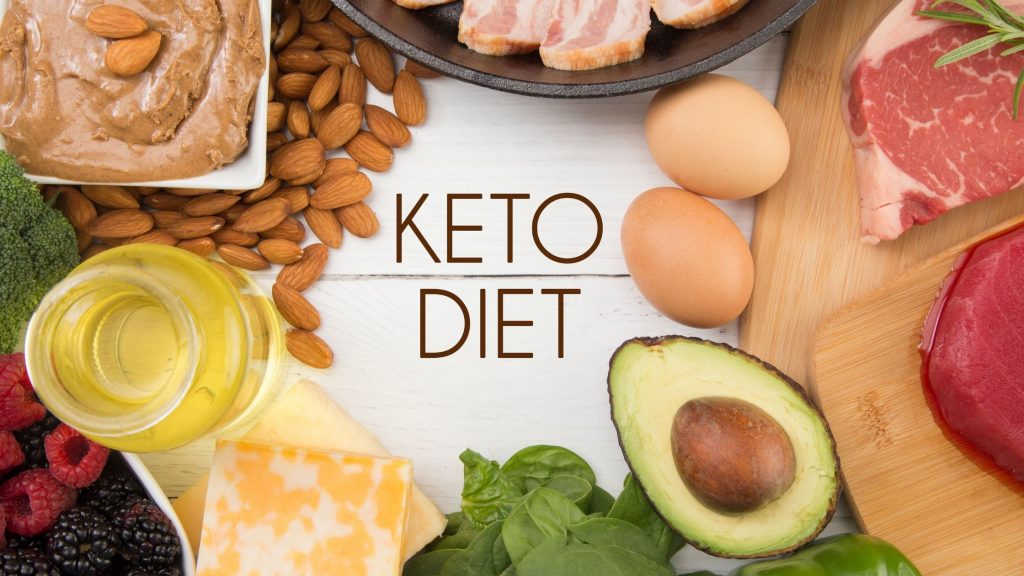Probiotics are live microorganisms (bacteria and yeasts) that, when taken, provide your body with health benefits.
its can be found in yogurt, fermented milk, other fermented foods, probiotic-fortified processed foods, and dietary supplements, and even beauty products. A range of probiotics are emerging, and globally there is a great demand for them.
Increasing evidence is emerging that the balance or imbalance of bacteria in your gastrointestinal tract or gut is linked to overall health and disease.
Its promote a healthy balance of microbes in your gut and have been linked to a wide range of health benefits. The consumption of probiotics can help with conditions such as acute gastroenteritis, irritable bowel syndrome, diarrhea, constipation, and necrotizing enterocolitis, neonatal late-onset sepsis, and urinary tract infections.
What Are Probiotics?
The term probiotic is derived from the Greek language and means “for life.” It was first coined in 1965 by Lilley and Stillwell to describe substances secreted by one microorganism that stimulate the growth of another.
The definition has undergone an extensive modification over the subsequent years.
Probiotics are defined by the Joint Food and Agricultural Organization of the United Nations/World Health Organization Working Group as “Live microorganisms that, when administered in adequate amounts, confer a health benefit on the host.”
Basically, probiotics are a combination of live beneficial microbes (bacteria and/or yeasts) that naturally live in your body and provide health benefits to you if you take them in sufficient quantities.
How Do Probiotics Work?
Humans have trillions of microorganisms in their bodies that confer benefits on them in multiple ways.
These microbes are found everywhere on the body, including the gut, lungs, skin, mouth, vagina, and urinary tract. The microbes live with humans from birth and form a symbiotic relationship with humans. This relationship is vital to the normal health of humans.
The collection of microbes inside our bodies is known as microbiota. The microbiota is a combination of bacteria, yeasts, viruses, and protozoa. This diverse community of organisms works together to keep your body healthy.
Each individual has a unique microbiota. Although microbes are found everywhere in your body, the microbiota in your gut is crucial in maintaining your health.
Although people tend to think of bacteria and other microorganisms as harmful, many are actually beneficial to humans.
These beneficial bacteria, termed as ‘good’ bacteria, help digest food, destroy disease-causing organisms or produce vitamins. Many of the microbes found in probiotic products are similar to the ‘good’ microbes that naturally live in our bodies.
The ‘good’ microbes, including probiotics, live with other pathogenic microbes (disease-causing), or opportunistic, termed as ‘bad’ bacteria. These ‘bad’ bacteria are kept in check by the ‘good’ bacteria but can get out of control if given the opportunity.
Certain situations can lead to a disruption in the gut microbiota balance, i.e., the number of ‘good’ bacteria decreases, and the number of ‘bad’ bacteria increases.
If the ‘bad’ bacteria take over, they can knock your body out of balance by causing infection or inflammation. The ‘good’ bacteria then fight off and destroy the disease-causing bacteria to restore the balance within your body.
This balancing act keeps happening naturally in your body all of the time.
You don’t actually need to take probiotic supplements for it to happen. However, certain factors such as genetics, poor dietary habits, lifestyle, illness, and age can negatively impact the balance of the gut microbiota.
By consuming probiotics, we can restore the balance of microbes within the body and treat and even prevent some illnesses.
A well-balanced diet rich in fiber, supplemented with a high-quality probiotic, can improve the balance between ‘good’ and ‘bad’ bacteria and have nutritional and therapeutic properties.
Mechanisms of action of probiotics
The exact mechanisms by which probiotics complete their actions are still being researched. Experimental studies indicate that probiotics differ significantly in their mechanism of action; any single mechanism cannot account for all of their beneficial effects.
Considerable differences exist between probiotic species as well as certain strains. These studies have shown that the beneficial effects of probiotics may be either through enhancement of the epithelial barrier, modification of the local microbiota through the synthesis of antimicrobial compounds, competition for adhesion sites, competitive exclusion of pathogens, and modulation of the immune system.
Common Types of Probiotic Bacteria
To qualify as a probiotic, microorganisms must have several characteristics such as: identified at the genus, species, and strain levels; safe for human use; able to transit and survive within the GI tract; able to adhere to mucosal surfaces; able to proliferate and colonize in the human intestine or vagina; produce antimicrobial substances; able to neutralize pathogenic bacteria; show clinically valid health benefits; and remain stable during processing and storage.
A probiotic microbe is identified by the genus, species, and an alphanumeric designation that indicates its strain. For example, Lactobacillus, a very common genus of probiotics has numerous species, such as rhamnosus.
In Lactobacillus rhamnosus (abbreviated as L. rhamnosus) species there are many strains, e.g., L. rhamnosus GR-1. Here GR-1 is the strain.
The strains most widely used as probiotics belong mainly to the genera Lactobacillus and Bifidobacterium.
Other genera such as Bacillus, Streptococcus, and nonpathogenic strains of Escherichia are also used. Some yeast strains from the genus Saccharomyces are also safe and effective.
Lactobacillus is a common genus of probiotic. Nearly thirteen different Lactobacillus species are used as probiotics.
Lactobacillus lives inside your gut and is also commonly found in the vagina. It is found in many fermented foods and drinks, and in probiotic supplements.
Bifidobacterium is another common genus, with at least seven species used as probiotics.
Bifidobacterium resides in your gut and is the dominant microbe in breast milk. Probiotic supplements and fermented milk products are the best sources of Bifidobacterium.
Saccharomyces cerevisiae, known as baker’s yeast and Saccharomyces boulardii are the common probiotic yeasts.
Streptococcus thermophilus is a lactic acid bacteria which is commonly found in yogurt and cheese.
It is one of the most widely used bacteria in the dairy industry, and is also used as a probiotic.
Probiotic Food
In recent years, the consumers’ interest in healthy and nutritious food has increased tremendously.
Therefore, it’s no surprise that the consumption of probiotics for the betterment of health and well-being has increased globally in recent years.
People realize that to maintain their health, they must maintain healthy colonization in the gut by consuming probiotics
Probiotics are available in a variety of food products, dietary supplements, and drugs.
Although people think that they can have probiotics through only probiotic supplements, there are some foods that are naturally probiotic.
You may already have certain foods like yogurt and cheese in your daily diet that contain probiotics.
However, there are many other natural probiotic-rich foods that can replenish the ‘good’ bacteria in your gut.
Natural Probiotics
Fermented foods are the most natural source of the ‘good’ gut bacteria. Miso, tempeh, kefir, sauerkraut, kimchi, kombucha, pickles, and buttermilk are natural probiotics.
Commercial yogurts and commercial fermented milk (industrially manufactured) are excellent probiotic food carriers.
Probiotic-fortified foods such as bread, ice-creams, fruits and vegetable juices, dried fruits, fermented vegetables, vegetarian desserts, cereals, meats, and chocolates are also available.
Probiotics Supplements
Apart from food, you can get probiotics through probiotic supplements. These supplements are available in different forms, such as tablets, powders, capsules, drinks, and liquids.
If you don’t eat many fiber or fermented foods, probiotic supplements can support you to maintain a healthy gut.
Many probiotic supplements are available in the market that claim to offer several health benefits.
However, as with other dietary supplements, probiotics are neither tested nor approved by the FDA. So, you need to be careful with your purchases as it is likely that the manufacturer may make some false claims.
It is always best to talk to your doctor before taking any supplement or making any significant dietary changes.
Probiotics and Prebiotics
Prebiotics are non‐digestible dietary substances that beneficially affect the host by selectively stimulating the growth and activity of probiotic bacteria in the colon.
They consist of nonstarch polysaccharides and oligosaccharides (mostly fiber) that humans can’t digest properly. The ‘good’ bacteria in your gut help in the digestion of these fibers by eating them.
So, probiotics are living organisms consumed to increase the population of the ‘good’ bacteria in your gut, whereas prebiotics help probiotics flourish.
When probiotics break down prebiotics in the colon, prebiotics produce butyric acid, a short-chain fatty acid, which fuels digestive cells and protects your gut from harmful bacteria.
Prebiotics are found in many fruits and vegetables that contain complex carbohydrates. Bananas, berries, asparagus, onions, garlic, and leeks are some prebiotic-rich foods.
Synbiotics are products that combine probiotics and prebiotics.
A symbiotic product provides the benefit of both a prebiotic and probiotic.
Health Benefits of Probiotics
Several scientific works and studies have been carried out to shed light on the crucial role of probiotic microbes in preventing and curing various diseases and disorders.
Promising results have been observed in many clinical trials for infection control, health improvement, and diseases treatment and management in humans.
Benefits of probiotics have been observed for following conditions –
- Acute diarrhea
- Constipation
- Inflammatory bowel disease
- Irritable bowel syndrome
- Traveler’s diarrhea
- Crohn’s disease
- Viral respiratory tract infection
- Invasive candidiasis
- Bacterial vaginosis
- Chronic kidney disease (CKD)
- Periodontal diseases, peri-implant diseases, and cavities
- Urinary tract infection
- Asthma
- Diabetes and Obesity
- Colorectal cancer
- Seasonal allergies
- Cardiovascular disease
- Eradication of Helicobacter pylori
- Immune response
Probiotics for Constipation
Constipation is a common problem that can affect many of us at some point in our lives.
Probiotics can help relieve constipation through several mechanisms such as short-chain fatty acid production, decreased colonic pH, electrolyte balance, pathogen control, etc.
Researchers at King’s College in London found that probiotics reduced “gut transit time” and increased the stool frequency and stool consistency (softened stools), making them easier to pass. Bifidobacterium-containing probiotics appeared to be the most effective.
Probiotics have been found to help ease childhood constipation, medication induced constipation, constipation in pregnant women, and chronic constipation in the elderly.
Side Effect of Probiotics
Although probiotics are generally considered safe and provide various health benefits, can also cause some side effects. Most of the side effects are digestive in nature, such as gas or bloating and usually clear up within a few days or weeks.
However, probiotics may cause problems for people with certain medical conditions, such as diabetes or a weakened immune system. So, if you have any pre-existing health conditions, it’s best to consult a healthcare professional before taking probiotics.
The other possible risks include
- Increased risk of infection
- Developing skin problems
- Developing antibiotic resistance
- Developing allergies
Probiotics in India
Globally people are looking for healthier options in food products as part of improving overall health and wellness.
India is no different. Probiotics are generating interest in Indian people, although presently India is a tiny player in the global probiotic market.
We can say that the Indian probiotics market is still in its infancy, with people still learning about the benefits of probiotics.
The Indian probiotics market is primarily focused on digestive and immune health. Probiotic-infused juices, milk, yogurt-based drinks, and beverages are gaining popularity.
Multinational food brands are realizing India ’s value as potential market for probiotic products.
Brands like Epigamia, Nestle, and Danon have forayed into the probiotics market in India and have gained considerable success. Yakult Danone India (P) Ltd’s Yakult probiotic fermented milk drink is one of the most popular beverages in India.
Homegrown Indian brands like Mother Dairy and Amul are also active in the probiotics market. Mother Dairy’s Nutrifit and Amul’s probiotic ice cream have been lapped up by probiotic lovers. Recently, another Indian brand MO’s Superfoods, launched MO’s Kefir in India.
Besides these foods, probiotic supplements like Carbamide Forte Probiotics Supplement, Kyo-Dophilus Powder, Boldfit Probiotics Supplement, etc., are available in the Indian market.
However, the Indian market is still underdeveloped and underpenetrated. There is plenty of scope for growth.
As gut health awareness rises, the demand for probiotic products and supplements will increase.
It remains to be seen how quickly the companies tap into this market and launch a slew of healthy probiotic products.
Conclusion
Probiotics are fast gaining popularity as healthy functional foods.
They are foods that contain live microorganisms. These microorganisms play an important role in keeping your body healthy.
They can boost the immune system, improve digestion, prevent allergies, and stop eczema. However, you must maintain the balance of these bacteria present in your gut. If the balance gets disturbed, the ‘bad’ bacteria in your gut can destroy your health.
A good fiber-rich diet, supplemented with a high-quality probiotic, will restore and improve the balance between ‘good’ and ‘bad’ bacteria and bestow several nutritional and therapeutic benefits.
There are hundreds of different probiotic strains. All of these strains perform different functions in our bodies.
Lactobacillus and Bifidobacterium are the most popular probiotic strains and have been proven to provide several health benefits. However, any probiotic strains must be assessed for health benefits and safety before it can be introduced in food products.
Probiotics are available naturally through foods and beverages like kimchi, sauerkraut, kefir, and yogurt. If these foods don’t satisfy your probiotic requirement, probiotic supplements are also available. All these things help restore and improve your gut microbiota balance.
Probiotics improve gut and immune health and help prevent and treat a variety of disorders like gastrointestinal, cancer, respiratory, genitourinary, skin, etc.
With health-consciousness and awareness among people increasing all over the world, the global probiotics market is only going to grow. Currently, the world market is valued at USD 49.4 billion and estimated to reach USD 69.3 billion by 2023.



